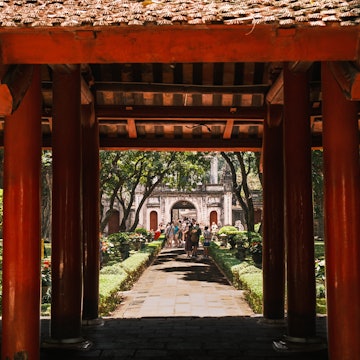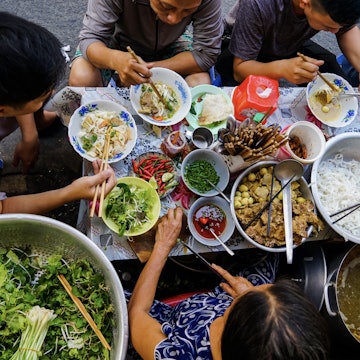

Let's demystify how to visit Bali when you're skint © Cheryl Ramalho / Getty Images
Bali on the cheap? Most would struggle to find ways to spend an entire lottery jackpot on the sun-drenched Indonesian island.
Still, there are times when we need to tighten the purse strings. Such as when you're at the beach, cocktail in hand, and you start daydreaming about extending your Bali stay again. For, say, another month to two. But with some careful planning and an open mind, Bali can be completely accessible for travelers of any budget.
Here are 10 tips to keep costs down.

Daily costs
Hostel room: IDR 200,000 per night (in a shared dorm)
Basic hotel room for two: From IDR 545,000 per night
Self-catering apartment (including Airbnb): From IDR 280,000 per night
15-minute Grab ride-share journey: IDR 116,000
Cocktail at a beach bar: IDR 100,000
Bottle of Bintang beer: IDR 31,000
Dinner for two at a mid-range restaurant: IDR 374,000
1. Work out your priorities
One of the most common questions from travelers heading to Bali is whether it’s cheaper than Thailand (or various other popular destinations in Southeast Asia). But it’s important to remember that both are relatively large countries, so it depends on where you visit and what you like to do. Popular beach resorts such as Kuta and Seminyak are generally more expensive. Lesser-known areas tend to be better value for money.
Cheap vacations in Bali don’t have to mean skimping on everything. Simply work out what your priorities are. Lesser-visited spots, such as Canggu on the southern coast, are more likely to have cheaper accommodation, but you’ll inevitably need the odd taxi journey to reach the shops or nearby nightlife spots. More popular areas have no shortage of ridiculously cheap hostels, but bars and restaurants tend to be more expensive in remote areas.

2. Eat (and drink) like a local
One of the best ways to cut the costs of a Bali vacation is to make a beeline for warungs – small, family-run restaurants and street food stalls. The food isn’t only ridiculously cheap but delicious, too. Popular warung dishes include nasi goreng (fried rice served with chicken or prawns) and mie goreng (fried noodles). Most warungs serve food to-go, so they’re great for take-out meals. Save more by drinking local, too. Opt for Indonesian lagers like Bintang.
3. Do I need to leave a tip?
Tipping isn’t customary in Indonesia, although gratuities of 10-20% are common if the service is great. A word of warning, though: it’s increasingly common for restaurants to add service charges to bills. Always check what’s included before you tip.
4. Don’t forget your travel insurance
Skimping on travel insurance might sound like a great way to save cash, but in reality, you could end up significantly worse off. Bali’s roads aren’t the safest, and if you’re planning on hiring a moped or motorbike (both brilliant options when it comes to getting around Bali), you’ll need to make sure your insurance policy will pay out in the event of an accident.
It’s also worth noting that simple things – such as not wearing a helmet or adequate clothing when riding a scooter – can invalidate insurance. If you’re considering certain high-risk activities, such as a PADI scuba diving course or a jet-skiing session, standard insurance policies likely won’t cover you. Add protection for these activities before you go.

5. Use ridesharing apps
Uber is no longer available in Bali (the company pulled out of Southeast Asia in 2018), but there are two great ridesharing apps: Indonesian company Gojek, and Grab. Gojek’s rates are generally lower, and transport options include mopeds (drivers will typically provide helmets).
For longer distances, such as from Denpasar in the south to Padangbai on the eastern coast (the departure point for ferries heading to the Gili Islands), taxis will likely be the best option. For cheaper fares, negotiate a price beforehand. You should also buddy up with some fellow travelers if you can. You're almost guaranteed that someone in your hotel or hostel will be heading to the same place or somewhere along the route.
6. Invest in a water purification device
Drinking tap water is generally not a good idea in Bali. Nor is spending out on ocean-polluting plastic water bottles. Buy a water purification device before you head to Bali instead. The most common types are bottles with built-in filters from brands such as Lifestraw or Brita. Steripen also makes pocket-sized water purifiers, which use UV light to kill harmful bacteria.

7. Head off the beaten path
Kuta is a lot of fun. Ubud is beautiful. But prices are higher in Bali’s more popular areas. Almost everything costs less in off-the-beaten-path destinations. Try Sanur, a low-key beach resort with great snorkeling, Uluwatu, known for its Hindu temples and a growing number of hip hotels, or laid-back Lovina, which has black sands and rushing waterfalls.
If being close to the action is a priority, avoid staying in the immediate center of the town or the beach resort in question. It is surprising how much cheaper hotel prices are a little further out – and the noise of the nightclub or beach bar is less likely to disturb your sleep.
8. Haggle (within reason)
In recent years, there’s been somewhat of a backlash against haggling, but we’re in favor of it – within reason. If you’re nervous about asking for a discount but suspect the price of that beautiful sarong or plastic “I love Bali” magnet is too high, shop around. Likely, the item will still be in stock when you return. Especially that magnet. You will almost always be able to get a reduction on the listed price. Just don’t offend by being unreasonable.

9. Avoid peak season
The cheapest time of year for a Bali vacation? Rainy season (October to February). But wait – it's also one of the best times to visit. This is when the island explodes with lush greenery and its waterfalls transform into thundering backdrops for selfies. Visitors also don't suffer from the inevitable heat-related fatigue travelers can experience during the sunniest months. Rains also tend to be short and sweet (January is the month with the most rainfall), so even if you’re caught in a downpour, your clothes will usually be dry in a matter of minutes.
10. Ask for discounts for longer stays at hotels
Negotiating a discount for longer stays can be a useful tactic to save money on accommodation. This works best at hostels and independent hotels – requesting a discount at the Four Seasons or Ritz-Carlton is unlikely to result in a discount (although if you’re staying in either, you’re probably not bothered about saving a few dollars).
It’s much easier to ask for this kind of discount when you’re on the ground, so If you’re worried about ending up with nowhere to stay, consider booking your first night through a website that allows for last-minute cancellations, then try and bag a better deal once you’re out there.
Take your Indonesia trip with Lonely Planet Journeys
Time to book that trip to Indonesia
Lonely Planet Journeys takes you there with fully customizable trips to top destinations–all crafted by our local experts.

























